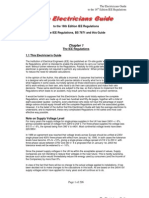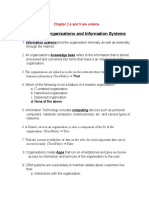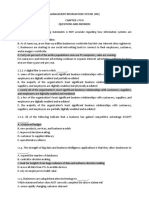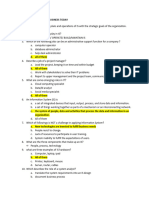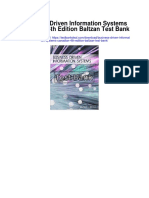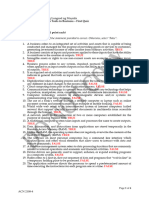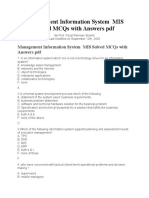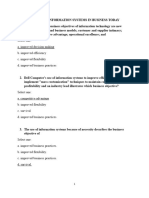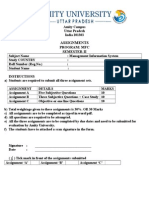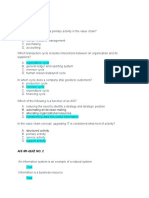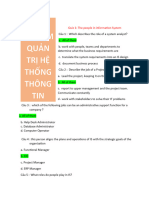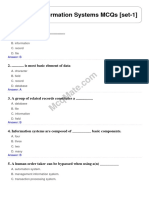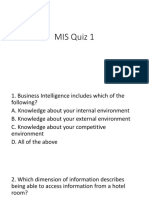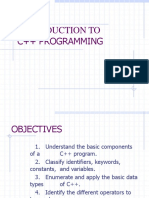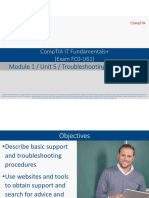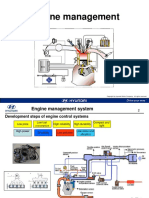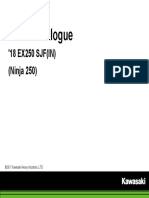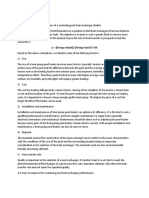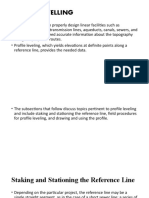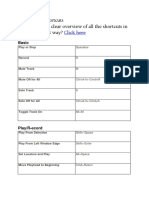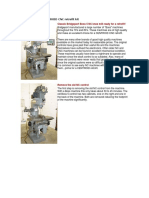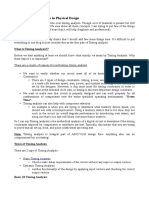0 ratings0% found this document useful (0 votes)
379 viewsMIS Quiz 1
MIS Quiz 1
Uploaded by
Don Erick Bonus Here is a SWOT analysis for the JRU College Enrolment Process with 3 items per category:
Strengths:
1. Online application system allows for streamlined enrollment.
2. Scholarship and financial aid programs help attract students.
3. Wide variety of degree programs appeal to different interests.
Weaknesses:
1. Limited campus housing makes commuting difficult for some.
2. Advising resources are stretched thin during peak enrollment periods.
3. Technology infrastructure sometimes struggles with high traffic.
Opportunities:
1. Growing demand for higher education from rising populations.
2. Partnerships with local employers provide internship and job opportunities.
3. Expanding online/hybrid
Copyright:
© All Rights Reserved
Available Formats
Download as PPTX, PDF, TXT or read online from Scribd
MIS Quiz 1
MIS Quiz 1
Uploaded by
Don Erick Bonus0 ratings0% found this document useful (0 votes)
379 views22 pages Here is a SWOT analysis for the JRU College Enrolment Process with 3 items per category:
Strengths:
1. Online application system allows for streamlined enrollment.
2. Scholarship and financial aid programs help attract students.
3. Wide variety of degree programs appeal to different interests.
Weaknesses:
1. Limited campus housing makes commuting difficult for some.
2. Advising resources are stretched thin during peak enrollment periods.
3. Technology infrastructure sometimes struggles with high traffic.
Opportunities:
1. Growing demand for higher education from rising populations.
2. Partnerships with local employers provide internship and job opportunities.
3. Expanding online/hybrid
Original Description:
my quiz 1
Copyright
© © All Rights Reserved
Available Formats
PPTX, PDF, TXT or read online from Scribd
Share this document
Did you find this document useful?
Is this content inappropriate?
Here is a SWOT analysis for the JRU College Enrolment Process with 3 items per category:
Strengths:
1. Online application system allows for streamlined enrollment.
2. Scholarship and financial aid programs help attract students.
3. Wide variety of degree programs appeal to different interests.
Weaknesses:
1. Limited campus housing makes commuting difficult for some.
2. Advising resources are stretched thin during peak enrollment periods.
3. Technology infrastructure sometimes struggles with high traffic.
Opportunities:
1. Growing demand for higher education from rising populations.
2. Partnerships with local employers provide internship and job opportunities.
3. Expanding online/hybrid
Copyright:
© All Rights Reserved
Available Formats
Download as PPTX, PDF, TXT or read online from Scribd
Download as pptx, pdf, or txt
0 ratings0% found this document useful (0 votes)
379 views22 pagesMIS Quiz 1
MIS Quiz 1
Uploaded by
Don Erick Bonus Here is a SWOT analysis for the JRU College Enrolment Process with 3 items per category:
Strengths:
1. Online application system allows for streamlined enrollment.
2. Scholarship and financial aid programs help attract students.
3. Wide variety of degree programs appeal to different interests.
Weaknesses:
1. Limited campus housing makes commuting difficult for some.
2. Advising resources are stretched thin during peak enrollment periods.
3. Technology infrastructure sometimes struggles with high traffic.
Opportunities:
1. Growing demand for higher education from rising populations.
2. Partnerships with local employers provide internship and job opportunities.
3. Expanding online/hybrid
Copyright:
© All Rights Reserved
Available Formats
Download as PPTX, PDF, TXT or read online from Scribd
Download as pptx, pdf, or txt
You are on page 1of 22
MIS Quiz 1
1. Business Intelligence includes which of the
following?
A. Knowledge about your internal environment
B. Knowledge about your external environment
C. Knowledge about your competitive
environment
D. All of the above
2. Which dimension of information describes
being able to access information from a hotel
room?
A. Time dimension
B. Location dimension
C. Form dimension
D. None of the above
3. Which of the following refers to using
communications technologies to work in a location
other than a central location (such as an office
building)?
A. Wireless networks
B. Business Intelligence
C. Telecommuting
D. Remote desktop
4. Which term describes electronic commerce
conducted over a wireless device such as cell
phone or PDA?
A. Mobile Computing
B. EIS
C. E-Commerce
D. M-Commerce
5. The responsibility for monitoring the daily
activities of a business falls to this organizational
level:
A. Senior management.
B. Middle management.
C. Operational management
D. Knowledge workers.
6. All of the following statements describe an
information-literate knowledge worker, except:
A. Can define what information they need
B. Knows how and where to obtain that
information
C. Understand information before they even
receive it
D. Acts appropriately based on the information
7. Which of the following represents the flow of
information between the HR manager and the
Marketing manager?
A. Upward flow
B. Downward flow
C. Horizontal flow
D. Outward flow
8. Decentralized computing occurs when computing
power is distributed to functional business areas and
knowledge worker desktops. Decentralized computing
is made possible by:
A. Inexpensive knowledge workers
B. Inexpensive personal computer systems
C. Decreasing network speeds
D. Increasing costs of electricity
9. Which of the following is the primary tool used
by organizations to support shared information?
A. PDA
B. Database
C. Application
D. None of the above
10. Processed ______________________ is also called
______________, while the most raw elements of facts
and figures are known as ______________.
A. Data; Knowledge; Information
B. Information; Data; Knowledge
C. Information; Knowledge; Data
D. Knowledge; Data; Information
11. What are the two main types of software?
A. Utility and output
B. Application and system
C. CPU and system
D. Application and input
12. People used to be the most important asset for a
company. But in the information age, companies need
people with:
A. Data
B. Information
C. Knowledge
D. Computers
13. What is information?
A. Data that has a particular meaning within a specific
context
B. Information with a particular meaning within a
specific context
C. Data that has no particular meaning
D. None of the above
14. What is the goal of a customer relationship
management system?
A. To gain customers
B. To eliminate negative interactions with
customers
C. To eliminate the need for customers
D. None of the above
15. Which term describes a concept that encourages and
facilitates collaborative processes between members of a
supply chain?
A. Collaborative planning, focusing, and reordering (CPFR)
B. Collaborative planning, forecasting, and replenishment
(CPFR)
C. Collaborative planning, forecasting, and reordering (CPFR)
D. Collaborative planning, focusing, and replenishment (CPFR)
16. When nearly all core business processes are
digitally enabled,
A. the firm is more competitive and efficient.
B. the firm no longer needs paper records.
C. more employees will be required.
D. every employee must be computer literate.
17. Decision Support Systems (DSS) help
managers make decision that are unique, rapidly
changing and not easily specified in advance.
A. True
B. False
18. A SKYPE conference call using VoIP and
webcams is an example of a remote synchronous
collaboration tool.
A. True
B. False
19. Most MISs use sophisticated mathematical
models or statistical techniques.
A. True
B. False
20. A transaction processing system (TPS) is a
computerized system that performs and records
the daily routine transaction necessary to conduct
business.
A. True
B. False
SWOT ANALYSIS
Create a SWOT Analysis for the JRU College Enrolment Process. Name
at least 3 items per category/process.
You might also like
- Concept Based Practice Questions for UiPath RPA Associate Certification Latest Edition 2023From EverandConcept Based Practice Questions for UiPath RPA Associate Certification Latest Edition 2023No ratings yet
- ADM2372 Midterm F2018 Kadri SolutionsDocument11 pagesADM2372 Midterm F2018 Kadri SolutionstaylorNo ratings yet
- Itis 2P91 Midterm QuestionDocument28 pagesItis 2P91 Midterm QuestionnguyentamNo ratings yet
- Harvard Business Review on Aligning Technology with StrategyFrom EverandHarvard Business Review on Aligning Technology with StrategyRating: 3.5 out of 5 stars3.5/5 (4)
- CompTIA A+ Certification All-in-One Exam Questions Prep (220-701 & 220-702)From EverandCompTIA A+ Certification All-in-One Exam Questions Prep (220-701 & 220-702)Rating: 2.5 out of 5 stars2.5/5 (6)
- Electricians GuideDocument296 pagesElectricians Guidemaeid75% (4)
- Ins Midterm 1Document11 pagesIns Midterm 1tamii9665No ratings yet
- MCQ IsmDocument51 pagesMCQ Ismraj23.sutarNo ratings yet
- Information System QuizzesDocument3 pagesInformation System Quizzesngonhuy5015No ratings yet
- IT App PrelimsDocument6 pagesIT App PrelimsKwyneth DeomaniaNo ratings yet
- Final Study Guide MIS315 2010v3SDocument32 pagesFinal Study Guide MIS315 2010v3SJennifer PearsallNo ratings yet
- Organisations and Information SystemsDocument49 pagesOrganisations and Information SystemsaarhaNo ratings yet
- Final Study Guide MIS315 2010v3SDocument32 pagesFinal Study Guide MIS315 2010v3SBoni FaciNo ratings yet
- Main Mis QuizDocument34 pagesMain Mis QuizPaafori100% (2)
- Management Control and Information System V1Document10 pagesManagement Control and Information System V1solvedcareNo ratings yet
- Trắc nghiệm QTHTTTDocument15 pagesTrắc nghiệm QTHTTTTrần Hoàng DiệuNo ratings yet
- Quiz 4 QTHHTTDocument3 pagesQuiz 4 QTHHTTHiền Mỹ LýNo ratings yet
- 12.information Systems in BusinessDocument12 pages12.information Systems in BusinessHajar NfNo ratings yet
- Management Control and Information System AssignmentDocument8 pagesManagement Control and Information System AssignmentSangeeta ChhetriNo ratings yet
- Information System ManagementDocument8 pagesInformation System Managementngonhuy5015No ratings yet
- Business Driven Information Systems Canadian 4th Edition Baltzan Test BankDocument58 pagesBusiness Driven Information Systems Canadian 4th Edition Baltzan Test Bankraygallegosrtdcpgsenw100% (13)
- IT Application Tools in Business (ACN 2108-4) - First QuizDocument4 pagesIT Application Tools in Business (ACN 2108-4) - First QuizJames Matthew BedayoNo ratings yet
- MIS QuestionsDocument10 pagesMIS QuestionsbeleNo ratings yet
- TRẮC-NGHIỆM-MIS (thầy Huy)Document64 pagesTRẮC-NGHIỆM-MIS (thầy Huy)Le Thi Kim ChiNo ratings yet
- Multinational Management 6th Edition Cullen Test BankDocument12 pagesMultinational Management 6th Edition Cullen Test Bankcoactiongaleaiyan100% (21)
- IT-Answers JELODocument4 pagesIT-Answers JELORaymond PascualNo ratings yet
- File Quizz File Trac Nghiem CompressDocument20 pagesFile Quizz File Trac Nghiem CompressNgọc TuyếtNo ratings yet
- MIS MCQ Question BankDocument14 pagesMIS MCQ Question BankMavani sneha100% (1)
- Questions)Document18 pagesQuestions)Johhny BlazeNo ratings yet
- 7 Information Technology07092021Document9 pages7 Information Technology07092021MD. Rezwanul HaqueNo ratings yet
- N-MIS-10.0Document43 pagesN-MIS-10.0Thao PhamNo ratings yet
- SolutionsDocument10 pagesSolutionsAhmedNo ratings yet
- It-Questions QuizDocument4 pagesIt-Questions QuizRaymond PascualNo ratings yet
- Combined - Out Icai MCQDocument1,195 pagesCombined - Out Icai MCQShivaniNo ratings yet
- IT Application Tools in Business (ACN 2108-6) - First Quiz NO ANSWERDocument4 pagesIT Application Tools in Business (ACN 2108-6) - First Quiz NO ANSWERHiedelynLlanoNo ratings yet
- CLASS 9 IT & ITes Enabled Services - Question BankDocument6 pagesCLASS 9 IT & ITes Enabled Services - Question Bankyour4evergurlNo ratings yet
- Ds MCQDocument38 pagesDs MCQprashil waseNo ratings yet
- MFC 2nd Semester Mis Assignment 1 MisDocument8 pagesMFC 2nd Semester Mis Assignment 1 MisSumayaNo ratings yet
- Computers in Management: Part A Descriptive Type QuestionDocument16 pagesComputers in Management: Part A Descriptive Type QuestionAiDLo0% (2)
- Introduction To Information SystemDocument10 pagesIntroduction To Information SystemAakash Morya100% (1)
- Spring 2023-2024 Assignment One: Information Systems For ManagementDocument4 pagesSpring 2023-2024 Assignment One: Information Systems For Managementahmedm06178No ratings yet
- 10 - 48!09!21!11!2022 - Information System For Managers 2Document7 pages10 - 48!09!21!11!2022 - Information System For Managers 2Papa DeltaNo ratings yet
- DocumentDocument43 pagesDocumentVirendra RamtekeNo ratings yet
- 252a - Management Information SystemDocument21 pages252a - Management Information SystemAbdul Salam Kuki KhelNo ratings yet
- AaaaaaaaaaaaaaaaDocument9 pagesAaaaaaaaaaaaaaaaHuế Nguyễn Thị HồngNo ratings yet
- IEEM660 Test BankDocument100 pagesIEEM660 Test Bankj6xtv2ww27No ratings yet
- MIS ExamDocument9 pagesMIS ExamEndash HaileNo ratings yet
- Ais M1-Quiz No. 1: B. Automating All Decision Making C. Allocating Organizational ResourcesDocument12 pagesAis M1-Quiz No. 1: B. Automating All Decision Making C. Allocating Organizational ResourcesJenny Ann ManaladNo ratings yet
- AIS QuesDocument13 pagesAIS QuesNguyễn Hương QuỳnhNo ratings yet
- I.T. July 2013Document4 pagesI.T. July 2013sherazNo ratings yet
- Sample Model ExamDocument10 pagesSample Model ExamAmir KanNo ratings yet
- QuizDocument14 pagesQuizvothithanhtrang1973haiNo ratings yet
- Chapter 01Document18 pagesChapter 01Chanchal KushwahaNo ratings yet
- CSC July Adni (Part A, B & C)Document9 pagesCSC July Adni (Part A, B & C)Adni NabilaNo ratings yet
- Quizz QTHTTDocument16 pagesQuizz QTHTTAnh Tú TrươngNo ratings yet
- COMP111 (Introduction To Information System) PRELIMS ANSWER KEYDocument3 pagesCOMP111 (Introduction To Information System) PRELIMS ANSWER KEYHerman Tyson Asanias100% (3)
- Business Information Systems Set 1Document6 pagesBusiness Information Systems Set 1TholangNo ratings yet
- Mastering Next Generation IT: Executive Guide to Enterprise Technology Transformation & the Business of Cloud ServicesFrom EverandMastering Next Generation IT: Executive Guide to Enterprise Technology Transformation & the Business of Cloud ServicesNo ratings yet
- Bring Your Own Device (BYOD): The mobile computing challengeFrom EverandBring Your Own Device (BYOD): The mobile computing challengeBCS, The Chartered Institute for ITNo ratings yet
- Data Entry Operator: Skills, Software, Career Tips, and Interview Q&AFrom EverandData Entry Operator: Skills, Software, Career Tips, and Interview Q&ANo ratings yet
- New IT Technology Issues Facing CIOs: How CIOs Can Stay On Top Of The Changes In The Technology That Powers The CompanyFrom EverandNew IT Technology Issues Facing CIOs: How CIOs Can Stay On Top Of The Changes In The Technology That Powers The CompanyNo ratings yet
- Revision List: For Team EliteDocument2 pagesRevision List: For Team EliteDon Erick BonusNo ratings yet
- Comptia It Fundamentals+ (Exam Fc0-U61) : Module 5 / Unit 1 / Security ConcernsDocument18 pagesComptia It Fundamentals+ (Exam Fc0-U61) : Module 5 / Unit 1 / Security ConcernsDon Erick BonusNo ratings yet
- MIS Quiz 1Document22 pagesMIS Quiz 1Don Erick BonusNo ratings yet
- MIS Midterms QUIZ 2 (Key)Document26 pagesMIS Midterms QUIZ 2 (Key)Don Erick BonusNo ratings yet
- Introduction To C ProgDocument23 pagesIntroduction To C ProgDon Erick BonusNo ratings yet
- ITFPlus (FC0 U61) Module1 - Unit5Document13 pagesITFPlus (FC0 U61) Module1 - Unit5Don Erick BonusNo ratings yet
- Module 1 / Unit 3 / Using An Os: Comptia It Fundamentals+ Study Guide (Exam Fc0-U61)Document25 pagesModule 1 / Unit 3 / Using An Os: Comptia It Fundamentals+ Study Guide (Exam Fc0-U61)Don Erick BonusNo ratings yet
- Department of Trade and Industry Makati Philippines: Technical Thesis AdviserDocument1 pageDepartment of Trade and Industry Makati Philippines: Technical Thesis AdviserDon Erick BonusNo ratings yet
- ACE Hardware Database (Data) PDFDocument1 pageACE Hardware Database (Data) PDFDon Erick Bonus100% (1)
- EMS GasolineDocument39 pagesEMS GasolineKha TrầnNo ratings yet
- IBE Chapter 5Document19 pagesIBE Chapter 5veenaNo ratings yet
- Software Engineering: Bachelor of Science in (BSSE)Document1 pageSoftware Engineering: Bachelor of Science in (BSSE)Ahsen ZubairNo ratings yet
- CS625 Mcqs FinalTerm by Vu Topper RMDocument10 pagesCS625 Mcqs FinalTerm by Vu Topper RMOnly MoviesNo ratings yet
- Sales SheetDocument6 pagesSales SheetMohit BelaniNo ratings yet
- EQ7000 RSLINX Ethernet IP Driver Topic Configuration and OPC Client Test Application NoteDocument13 pagesEQ7000 RSLINX Ethernet IP Driver Topic Configuration and OPC Client Test Application NoteDellendo FarquharsonNo ratings yet
- Storage Type Search SequenceDocument34 pagesStorage Type Search SequenceSwamy KattaNo ratings yet
- Ninja 250 Fi 2018 Standart Non Abs Ex250sjfin PDFDocument99 pagesNinja 250 Fi 2018 Standart Non Abs Ex250sjfin PDFaryvhidayatNo ratings yet
- Iwatsu ADIX APS v6-4 Owners ManualDocument244 pagesIwatsu ADIX APS v6-4 Owners ManualDave Knight100% (1)
- 1267379259Document7 pages1267379259sinasayedanaNo ratings yet
- Wavelength-Division Multiplexing: WDM SystemsDocument7 pagesWavelength-Division Multiplexing: WDM SystemsAnand Singh ChauhanNo ratings yet
- Bank Key & House Bank CreationDocument8 pagesBank Key & House Bank Creationlavanlavanya810No ratings yet
- Izar Pulse HDocument2 pagesIzar Pulse HsaoNo ratings yet
- Dnsstuff:: Dynamic Host Configuration Dns Hijacking HierarchyDocument2 pagesDnsstuff:: Dynamic Host Configuration Dns Hijacking HierarchyAnonymous bD2XD9100% (1)
- Emarketer Brazil OnlineDocument11 pagesEmarketer Brazil OnlineManoj SharmaNo ratings yet
- η = (Energy output) / (Energy input) X 100Document2 pagesη = (Energy output) / (Energy input) X 100muhd fikriNo ratings yet
- Final Project Report For Inventory Control System For The Calculation and Ordering of Available and Processed ResourcesDocument101 pagesFinal Project Report For Inventory Control System For The Calculation and Ordering of Available and Processed ResourcesChutti SureshNo ratings yet
- Profile LevellingDocument23 pagesProfile Levellingمهندس ابينNo ratings yet
- Advanced Systemcare 1302172 PRO Serial Key 2020 Latest Version 100 Working PDFDocument8 pagesAdvanced Systemcare 1302172 PRO Serial Key 2020 Latest Version 100 Working PDFOscarKonzultNo ratings yet
- Fashion and You: E-Business Model & Supply ChainDocument21 pagesFashion and You: E-Business Model & Supply ChainabhishekniiftNo ratings yet
- RIVERSURVEYORDocument194 pagesRIVERSURVEYOREdgar isaacNo ratings yet
- Logic Pro X ShortcutsDocument9 pagesLogic Pro X Shortcutsluca100% (4)
- Starbucks Case StudyDocument4 pagesStarbucks Case StudyRyanNo ratings yet
- How To Install A CENTROID CNC Retrofit KitDocument3 pagesHow To Install A CENTROID CNC Retrofit Kitjavier medinaNo ratings yet
- WalkerDocument1 pageWalkerSami StauceanuNo ratings yet
- Sta Vlsi PDFDocument40 pagesSta Vlsi PDFRahul YadavNo ratings yet
- City of Stars Tab by Ryan Gosling, Added: July 18th, 2016Document3 pagesCity of Stars Tab by Ryan Gosling, Added: July 18th, 2016WillardFlemingNo ratings yet
- BPPC Profile - v2.1.0Document19 pagesBPPC Profile - v2.1.0Jai SinghNo ratings yet
- AIX Cheat SheetDocument31 pagesAIX Cheat SheetAnkit Garg100% (1)





